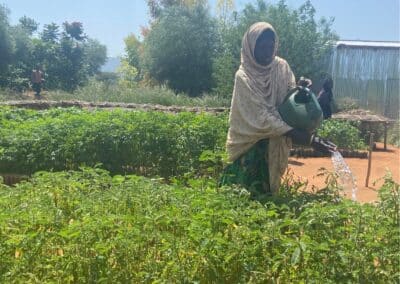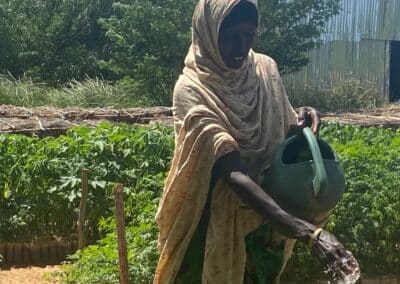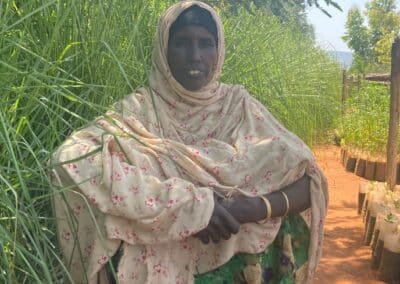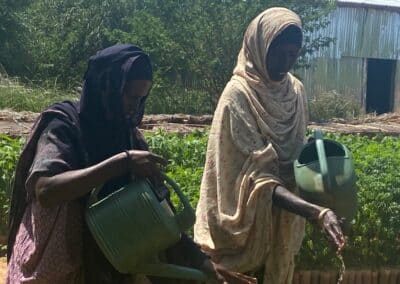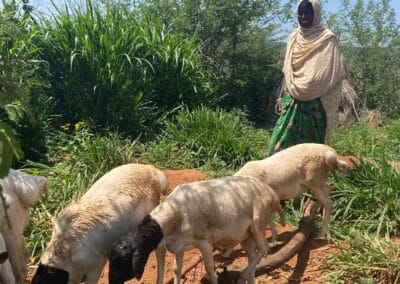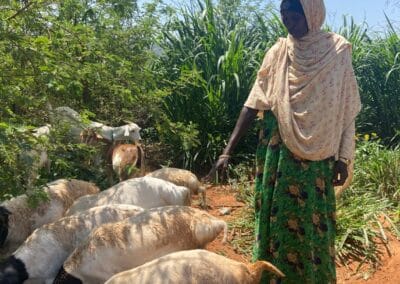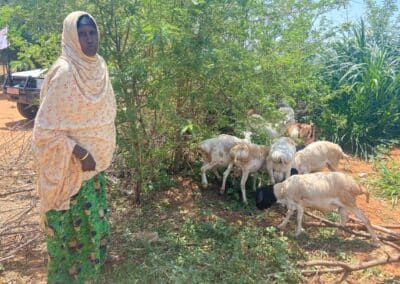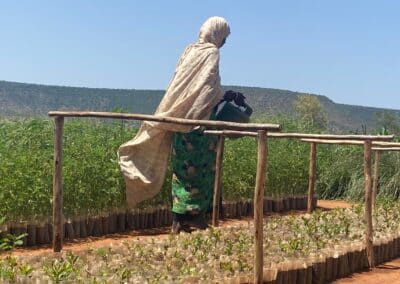Amina Awmalin is Ethiopian and lives in South Jijiga woreda, located in Hanchebi municipality, in the Somali region of Ethiopia. She is 45 years old, married and a mother of 8 children. She is currently raising goats, an activity that allows her to generate her own income and ensure her family’s livelihood.
This has been possible thanks to the support she has received in the framework of the Convenio we are developing in Ethiopia with AECID, in consortium with the NGO Rescate, and in collaboration with our local partners Ethiopian Catholic Church Social and Development Commission (ECC-SDCO) and Horn of Africa Voluntary Youth Committee (HAVOYOCO).
This initiative aims to strengthen the livelihoods of Somali agro-pastoral communities that live in a situation of vulnerability due to their exposure to extreme situations caused by climate and other social and economic disasters. In this way, it seeks to promote and consolidate rural development, access to water and care for the environment to ensure the resilience of these rural communities.
The previous situation
Before participating in the activities of this Convenio, Amina recalls: “Our situation was very difficult: we had no livelihoods, we were very vulnerable, food was insufficient and our livestock died because of the drought. Thus, she explains that her community experienced several consecutive and prolonged periods of water shortages, a phenomenon that made it difficult for its members to subsist. “We didn’t have enough food for our families, even though we sometimes received some food aid from the government,” he adds.
Thanks to training in sustainable agriculture and animal husbandry techniques and practices, Amina was able to join a livestock rearing income-generating group. She started her small breeding and selling business with two goats that she received as part of the covenant activities. She also participated in various trainings on income generation and women’s empowerment. Since then, Amina has been able to expand her livestock with 11 goats, and thanks to the profits from this activity she and her husband are able to contribute to household expenses and buy clothes and food for their children.
Another benefit of the Convenio has been the construction of a well, which has been a great help to the community. “It has benefited us a lot, as we now have water,” says Amina. Amina can now optimize her time and tasks, as she used to spend five hours a day fetching water from distant rivers or ponds, where the water quality was not always adequate, causing frequent illnesses.
Despite these improvements, Amina recognizes that there are many people in the area who remain vulnerable and in need. For this reason, she is committed to “show how I have changed and encourage others to improve their living conditions”, since “with the knowledge we now have we are able to optimize our income and the management of our natural resources”.
Coping with climate change
The consequences of climate change in the Somali region are evident and often extreme. “We suffer from droughts and the effects of environmental degradation,” laments Amina.
In this sense, the training provided under the Convenio is key, since “before, we had no knowledge of climate change and how it impacted us,” she acknowledges. In this way, people like Amina have discovered that certain actions are necessary to be able to adapt to this phenomenon and cope with its effects: “I have learned soil and water conservation measures aimed at protecting the environment and ensuring the production of more food,” she explains.
In addition, as part of the Convenio, participants have received four to five tree seedlings to plant and cultivate near their homes. As a result, Amina has a small plot of land with crops, fruit trees and fodder plants that improve the nutrition of her family and livestock.
The benefits of these initiatives are such that Amina confesses: “The microclimate in our area has changed, because as there are more and more trees, consequently, we have more water. She even comments that many neighbors now come to her property to enjoy the shade of the trees and “they adopt the practices we have developed when they see how much we have achieved”.






